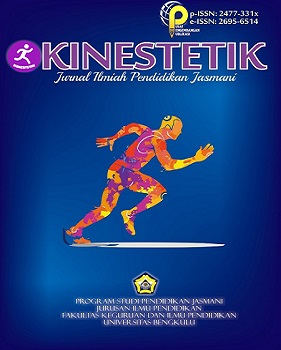Main Article Content
Abstract
This study aims to describe the validity of thematic-based PJOK modules for grade IV elementary schools in odd semesters. The research used is the development (Research & Development), Borg and Gall. The research subjects were 18 PJOK teachers from three sub-districts in Medan City, namely (Medan Johor, Medan Selayang, and Medan Deli), as well as 3 expert validators.A questionnaire is used to collect information. The module category was found to be very practical to use, with an average score of 95% based on the results of the three expert validations. The first PJOK teacher validated the results with an average score of 94 percent. and the average score on the wider cohort test is 92 percent. and operational field trials yielded results with an average score of 92 percent. From the three seasoned professionals (PJOK teachers) an average score of 92.6% was obtained, with a very decent category. This shows that the thematic-based PJOK module is valid for use by teachers in PJOK learning for grade IV elementary schools.
Keywords
Article Details
Copyright (c) 2023 Zuraidah Nurhadi, Budi Valianto, Eva Faridah, Indra Kasih

This work is licensed under a Creative Commons Attribution-ShareAlike 4.0 International License.
Authors who publish in this journal agree with the following terms:- Authors retain copyright and grant the journal right of first publication with the work simultaneously licensed under a Creative Commons Attribution-ShareAlike 4.0 (CC BY-SA) that allows others to share the work with an acknowledgement of the work's authorship and initial publication in this journal.
- Authors are able to enter into separate, additional contractual arrangements for the non-exclusive distribution of the journal's published version of the work (e.g., post it to an institutional repository or publish it in a book), with an acknowledgement of its initial publication in this journal.
- Authors are permitted and encouraged to post their work online (e.g., in institutional repositories or on their website) prior to and during the submission process, as it can lead to productive exchanges, as well as earlier and greater citation of published work (See The Effect of Open Access).
- This work is licensed under a Creative Commons Attribution-ShareAlike 4.0 International License.
References
- Dwicahyo, D. (2014). Pengembangan Perangkat Pembelajaran (Silabus, RPP, PHB, Bahan Ajar). Yogyakarta: Gava Media.
- Febrianti, D. (2021). Modul Pembelajaran PJOK Berbasis Tematik Terpadu untuk Peserta Didik pada Tema Kegemaranku ( Sub Tema : Gemar Bernyanyi dan Menari ). Bali: Jurnal Ilmu Keolahragaan Undiksha, 9(1): 1–7.
- Gall, (2002). Educational Research An Introduction. Arnis E. Burvikovs (Eds.) Boston New York: Library Of
- Gullickson, D. (2011). Review of Life-Span Development In Contemporary Psychology. New York: Springer Publishing Company.
- Gunarsa, D. (2008). Psikologi Perkembangan Anak dan Remaja. Jakarta: PT. BPK Gunung Mulia.
- Hanafi. (2013). Konsep Penelitian R&D Dalam Bidang Pendidikan. Saintifika Islamica. Banten: Jurnal Kajian Keislaman, 4(2): 129-149.
- Hernawan, H., Widiastuti, W., Timur, A. I., & Pradityana, K. (2018). Pengembangan Model Pengenalan Air untuk Anak Usia Dini. Jurnal Pendidikan Usia Dini, 12(2), 251-260.
- Mahendra, D. (2006). Perkembangan dan Belajar Motorik. Jakarta: UT Jakarta.
- Seto, M. (2015). Psikologi Perkembangan (I. Puspitawati (ed.). Bandung: Gunadarma.
- Sudira, P (2006). Buku Saku: Kurikulum Tingkat Satuan Pendidikan (KTSP) Sekolah Menengah Pertama. Jakarta:Ditjen Mandikdasmen.
- Sudjana, N. (2007). Media Pengajaran. Bandung: Sinar Baru Algasindo.
- Sudariyono. 2016. Metode Penelitian Pendidikan. Jakarta: Kencana.
- Trianto. (2010). Pengembangan Model Pembelajaran Tematik. S. Amri (ed.). Bandung: Prestasi Pustaka Publisher.
- Twiningsih, D. (2019). The Effectiveness Of Problem-Based Thematic Learning Module To Improve Primary School Student’s Critical Thinking Skills. Jakarta: Jurnal Pendidikan Biologi Indonesia, 5(1): 117–126.
- Prastowo. (2016). Pengembangan Bahan Ajar Tematik: Tinjauan Teoritis dan Praktik. Jakarta: Pranada Media Group.
- Winarmo. (2013). Metodologi Penelitian Dalam Pendidikan Jasmani. Malang: UM PRESS.
References
Dwicahyo, D. (2014). Pengembangan Perangkat Pembelajaran (Silabus, RPP, PHB, Bahan Ajar). Yogyakarta: Gava Media.
Febrianti, D. (2021). Modul Pembelajaran PJOK Berbasis Tematik Terpadu untuk Peserta Didik pada Tema Kegemaranku ( Sub Tema : Gemar Bernyanyi dan Menari ). Bali: Jurnal Ilmu Keolahragaan Undiksha, 9(1): 1–7.
Gall, (2002). Educational Research An Introduction. Arnis E. Burvikovs (Eds.) Boston New York: Library Of
Gullickson, D. (2011). Review of Life-Span Development In Contemporary Psychology. New York: Springer Publishing Company.
Gunarsa, D. (2008). Psikologi Perkembangan Anak dan Remaja. Jakarta: PT. BPK Gunung Mulia.
Hanafi. (2013). Konsep Penelitian R&D Dalam Bidang Pendidikan. Saintifika Islamica. Banten: Jurnal Kajian Keislaman, 4(2): 129-149.
Hernawan, H., Widiastuti, W., Timur, A. I., & Pradityana, K. (2018). Pengembangan Model Pengenalan Air untuk Anak Usia Dini. Jurnal Pendidikan Usia Dini, 12(2), 251-260.
Mahendra, D. (2006). Perkembangan dan Belajar Motorik. Jakarta: UT Jakarta.
Seto, M. (2015). Psikologi Perkembangan (I. Puspitawati (ed.). Bandung: Gunadarma.
Sudira, P (2006). Buku Saku: Kurikulum Tingkat Satuan Pendidikan (KTSP) Sekolah Menengah Pertama. Jakarta:Ditjen Mandikdasmen.
Sudjana, N. (2007). Media Pengajaran. Bandung: Sinar Baru Algasindo.
Sudariyono. 2016. Metode Penelitian Pendidikan. Jakarta: Kencana.
Trianto. (2010). Pengembangan Model Pembelajaran Tematik. S. Amri (ed.). Bandung: Prestasi Pustaka Publisher.
Twiningsih, D. (2019). The Effectiveness Of Problem-Based Thematic Learning Module To Improve Primary School Student’s Critical Thinking Skills. Jakarta: Jurnal Pendidikan Biologi Indonesia, 5(1): 117–126.
Prastowo. (2016). Pengembangan Bahan Ajar Tematik: Tinjauan Teoritis dan Praktik. Jakarta: Pranada Media Group.
Winarmo. (2013). Metodologi Penelitian Dalam Pendidikan Jasmani. Malang: UM PRESS.
